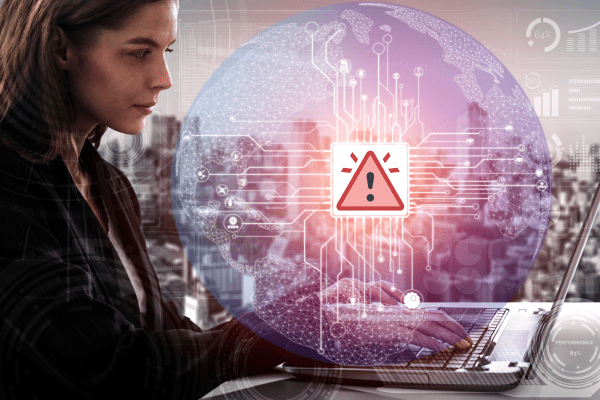3 Risks — And Rewards — of AI in Project Management

AI has the power to transform project management for the better — helping PMs automate manual tasks, accelerate decision-making, and make more time for actual strategizing. Still, the process of implementing AI into PPM platforms and workflows won’t happen overnight. And it won’t come without its risks.
In fact, as it stands, AI presents sort of a double-edged sword for project managers. On the one hand, data-driven AI platforms can help PMs better identify and mitigate risks in their project workflows before they occur. On the other, there are certain risks to integrating AI tools into PM processes — as with any new software or advanced technology.
So, the question remains: Will the proliferation of AI actually increase or decrease risk in project management? While there’s no clear-cut answer — especially as AI tools are still evolving and being implemented — we gathered insights from some top minds in project management to help shed some light on this conundrum.
Here’s what they had to say:
AI in project management: Risk or reward?
The overwhelming consensus seems to be that…well, there is no sure-fire answer. Rather, AI will present both risks and rewards for project managers. And AI’s overall impact will ultimately depend on how it’s implemented and utilized.
As project management professional Antonia I. said, “A tool is only as good as its utilization process.” She added, “Yes, AI will help simplify and reduce some of the burden, such as by automating risk review and distilling data from previous risk analyses to provide lessons learned. It will help sharpen that management process. But if we completely rely on AI to manage risk, then it becomes a bit of a problem.”
Aoife Ahern, global executive director for delivery excellence at Novartis, echoed this sentiment. “It’s not black and white,” she said. “How it’s implemented is going to be key.”
Still, she’s willing to take the risk of using AI to, well…identify risk. “I would prefer to see risk being identified and rated based on data rather than somebody’s personal opinion,” she said. “To be able to interrogate our data and see that, ‘This is likely to happen or not likely to happen,’ that’s a huge advantage. You’re learning from everybody else’s experience and the outcomes of those particular risks that were either identified or not identified at the offset.”

3 risks of AI in project management — and how to overcome them
So, yes, AI can present certain risks in project management. But it’s also primed to offer many career-changing benefits to PMs. That’s why it’s so important to understand those potential risks now, so you can get ahead of the learning curve and reap the many rewards of AI as it continues to mature.
With that in mind, let’s unpack three risks and obstacles of using AI in project management — and how to overcome them.
Setting and meeting new regulations
Of course, one of the biggest challenges of implementing AI will be meeting new regulations for data usage and privacy — both internally and externally.
“Large companies, in particular, have multiple layers of guidelines and policies,” said Arkad Amit Arkad, project management and product development leader at GSK. “PMs will have to understand the context in which they’re implementing AI.”
Even the Generative AI tools widely available today — like ChatGPT — pose risks for data privacy. “Some [PM] tools in the market are simply taking project information and sending it into ChatGPT to get an answer and push it back into the [project management] application,” said Yaniv Shor, Proggio CEO. “This is, of course, a very significant data breach.”
That’s why, to best ensure compliance with regulations, project managers should build native AI solutions into their platforms. As Shor said, “Users should make sure that the AI solution is really implemented inside the application, and that it’s part of the application framework — without sending the information to one of the ChatGPT engines out there.”
Using the right data
Project managers also risk using the wrong data to fuel their AI decision-making. As Ahern said, “To have scenario-based planning, you have to have the right data. You have to be monitoring [data quality], as you go along — what’s the completeness, what’s the accuracy of the data?” Or, as Arkad bluntly put it, “If you put garbage in, you get garbage out.”
That’s why project managers need to be extra vigilant about the quality of the data they’re feeding to their AI platforms. For example, Arkad recommends setting benchmarks for data input. He said, “It’s critical that, for the areas we operate in — such as the pharmaceutical industry — we have KPIs for data input before we think about KPIs for output.”

Combining AI with human input
Now, for what might be the biggest questions on project managers’ minds regarding the future of AI: Will AI actually replace humans or serve as their copilot? Is AI even capable of making human decisions? And if there are opportunities for AI and humans to work hand-in-hand, what will that even look like?
As Antonia said, “I think the main risk with AI is that it replaces the ingenuity of a human set of eyes reviewing a risk mitigation step, a risk outcome, a risk rating, etc. […] Yes, AI will help simplify the management process, but if we completely rely on AI to manage risk, then it becomes a bit of a problem.”
In fact, all of our PM experts seem to agree that humans will not be erased — but rather complemented — by AI. “What PMs will continue to bring to the table is that experience and knowledge.” Ahern said. “I think it’s less about fully automating tasks without oversight and more about getting recommendations [from AI].”
Arkad has even conducted tests to see how AI and humans can collaborate on risk management. Specifically, he asked ChatGPT to identify the top 10 risks for a new project manager handling product development for a certain vaccine.
“It provided those top 10 risks, and I actually agreed with some of them,” Arkad said. “Now, that doesn’t mean that I take those top 10 risks and put them in my risk register […] It’s very important to ensure that you are the final decision-maker as a PM. The system is only going to give you outcomes or options, but you’re the one deciding on the action.”
Want to learn more about how AI can impact the future of the industry — from data collection to risk analysis? Read our post, “Five Ways AI Can Transform Project Management—And Four Roadblocks.” Or get started with Proggio.